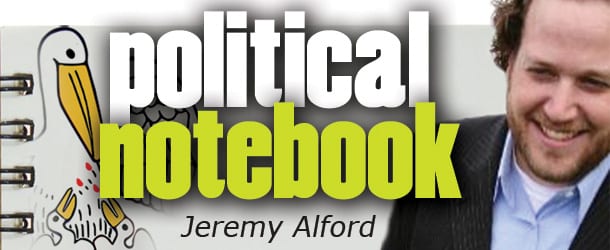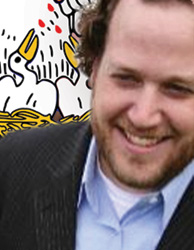The general counsel for the state’s premier newspaper and magazine association believes the “next frontier for public records law in Louisiana” will involve text messages and emails.
How the text messages of elected officials, appointees and public employees should be treated is a particularly tricky question, said Scott Sternberg, a First Amendment attorney and a partner with Sternberg, Naccari and White in New Orleans.
There’s little to no case law on the subject in Louisiana, he said. This means answers will come only with litigation or legislation.
“I think we’re going to see more and more exceptions to the public records law being written,” said Sternberg, the general counsel for the Louisiana Press Assoc.
The issue of email accounts is equally as challenging, especially in light of the growing number of volunteer government employees, like those serving on charter school boards, he said. “We’re used to having a school board that gets elected and is paid (with public money) and has regular meetings,” Sternberg said, comparing that structure to that of some charter school boards. “These are doctors and lawyers and friends of the (charter) school that are all using their Gmail accounts to communicate and organize the efforts of the school.”
While technology has certainly improved how people can keep in touch, Sternberg pointed out that cell phones have likewise created an environment where real-time communications are fairly simple — and often overlooked as a public record.
For example, do text messages between members of a public body, drafted when the body is meeting, instantly become public documents?
“What are we going to do about those text messages and what are we going to do about those emails when you have people on the dais texting each other about an ordinance they’re about to vote on?” he asked during an episode of The LaPolitics Report podcast. “You know, technically that’s a public record. That text message is a record created in the exercise of your public duties.”
But to obtain a definitive answer, Sternberg said it would likely take a citizen or reporter being denied public records related to text messages and that party filing suit against the appropriate arm of government.
House Members Meet Privately On Budget Gap
Louisiana’s current crop of state representatives can’t go anywhere these days without hearing about the dreaded “fiscal cliff,” which is code for the more than $1-billion budget deficit slated for next fiscal year.
So, they figured they may as well get together and talk about it among themselves. A bipartisan group of House members are expected to gather on Thursday, Oct. 12, for what is being billed as an “educational retreat.”
Rep. Lance Harris of Alexandria, the chairman of the House Republican Delegation, said budget reports will be delivered by legislative staffers and the lower chamber’s leadership. These reports will concern what the state is facing next year in terms of a shortfall.
“We’re looking for a possible way forward,” Harris told LaPolitics. “This starts a new chapter for everyone, and hopefully something bubbles to the surface. At the very least, everyone can kind of see where their peers are on all this.”
Taking part will be Rep. Gene Reynolds, the chairman of the House Democratic Caucus. “There are already a bunch of small groups working on ideas, and it’s a move in the right direction to pull in everyone we can — and I believe there will be a good turnout — to see what’s doable,” said Reynolds. “The best case scenario is that we walk away with something that we can take to the governor that makes him comfortable with calling a special session.”
Reynolds added he would like to see the House move toward some sort of consensus before Commissioner of Administration Jay Dardenne is “forced to come up with a doomsday budget.”
Dardenne is the chief budget architect for Gov. John Bel Edwards, who started warning lawmakers about the “fiscal cliff” last year when a set of temporary taxes were adopted.
Those temporary taxes — mostly in the form of an increase to the state sales tax structure — will expire at the end of the current fiscal year, on June 30, 2018.
Governor Remains Issue In PSC Race
Gov. John Bel Edwards isn’t on the fall ballot in name, but he is in spirit — at least when it comes to the special election for the Public Service Commission.
Former state Rep. Lenar Whitney, of Houma, is one of the three candidates in the race. She has been using the governor’s name and likeness as part of her central attack strategy.
One of her campaign’s more recent direct mail pieces took aim at both of her PSC opponents: former state Rep. Damon Baldone, of Houma, and Dr. Craige Greene, of Baton Rouge, who, like Whitney, are Republicans.
The mailer includes a photo of Edwards telling voters, “Just vote for either one of my guys!” It also tags Baldone and Greene for donating money to Edwards, among other things.
Baldone was temporarily appointed to the PSC seat by Edwards this year, and he is now running for the permanent job. Greene, meanwhile, has stated publicly that he regretted supporting Edwards in the past.
A Coattails Test For Higgins
Another name that’s not on the ballot this month is that of Congressman Clay Higgins, the freshman Republican who represents Acadiana.
But Higgins, nicknamed the “Cajun John Wayne” by reporters for his viral videos and raw approach, is picking horses in this fall’s races.
It could be an early indication of how long Higgins’ proverbial coattails are, as both of the races he’s involved himself with reach outside his 3rd Congressional District.
Higgins made the rounds at the Sugar Festival late last month with both state Sen. Neil Riser, of Columbia, who is running for treasurer, and former state Rep. Lenar Whitney, of Houma, who is a candidate for the Public Service Commission.
Higgins, Riser and Whitney are all Republicans.
Political History:Remembering Jim Garrison
Next month marks the 25th anniversary of the death of New Orleans district attorney Jim Garrison, a man with firm connections about the sprawling conspiracy theories involving the assassination of President John F. Kennedy.
According to his New York Times obituary, Garrison “asserted that Lee Harvey Oswald, whom the Warren Commission identified as the lone assassin in the president’s 1963 death, was not the killer and had ‘never fired a shot.’ Announcing that he had ‘solved the assassination,’ Mr. Garrison accused anti-Communist and anti-Castro extremists in the Central Intelligence Agency of plotting the president’s death to thwart an easing of tension with the Soviet Union and Cuba, and to prevent a retreat from Vietnam.”
Garrison did eventually prosecute the case, but the 34-day trial was sometimes portrayed in the mainstream media as a circus that concluded with an acquittal.
At six-foot-six, Garrison was “known for bar hopping along Bourbon Street, often wearing a white dinner jacket,” as The New York Times put it. In 1973, Garrison was indicted on federal charges of taking bribes to protect illegal pinball gambling. He defended himself and won. But the trial hurt his campaign for a fourth term.
He lost re-election to Harry Connick, Sr., ending a 12-year elected career. He later won a seat in Louisiana’s Fourth Circuit Court of Appeal in 1978, and remained there until he retired at age 70.
Months before his death, he returned to the limelight in Oliver Stone’s movie JFK, a narrative based largely on Garrison’s accounts, which grossed $195 million in the box office. He died in 1992 at his home in New Orleans.
They Said It
“Dead as a doornail.”
— U.S. Sen. John Kennedy, describing the Graham-Cassidy health care bill, in The AP
“(I’m) almost agnostic.”
— Gov. John Bel Edwards, on how he wants the state’s budget and revenue problems fixed, in the AP
“It’s just heartbreaking to me, man. And it pisses me off … My Sundays have a lot more Harley Davidson time now.”
— Congressman Clay Higgins, on the National Football League
“The president’s tweets are attention-grabbing. Who is going to be treasurer is not very compelling by comparison. It’s boring.”
— UL-Lafayette political scientist Pearson Cross, on projected low voter turnout and the treasurer’s race, in The Advocate.
The HOF Hits The Road
The induction ceremony and banquet for the Louisiana Political Hall of Fame next year will once again stray — rather far — from its geographic roots in Winn Parish. The 2018 shindig is slated for March 10 at the National WWII Museum in New Orleans.
The annual ceremony for the Louisiana Political Hall of Fame has long been marked — at least for attendees from south Louisiana — by a long drive north to Winnfield, a town that was once home to three Bayou State governors.
In 2016, however, the ceremony hit the road and was held in Lafayette, with the goal of trying to move it around to different cities every other year or so. The party was held again in Winnfield this year, but organizers are clearly sticking to their touring strategy, based on the choice of New Orleans.
The event always features memorable speeches by political players; a reception in the museum, when it’s in Winnfield; and an evening-ending, group singalong to “You Are My Sunshine.”
The museum, which has received some state funding in the past, is also home to Earl Long’s original campaign vehicle and Huey Long’s dining room set. More than 120 Louisiana politicos have been inducted into the museum’s Hall Of Fame since 1993.
The names for the new batch of inductees for 2018 have not yet been revealed.
For more Louisiana political news, visit www.LaPolitics.com or follow Jeremy Alford on Twitter @LaPoliticsNow.














Comments are closed.